Squamous-Cell Carcinoma
Squamous-cell carcinoma (SCC), also known as epidermoid carcinoma, is a group of cancers originating from squamous epithelial cells.
These cells form the surface layer of the skin, line hollow organs, and are present in the respiratory and digestive tracts. Despite sharing a common name, SCCs can manifest differently depending on the affected body site.
By Body Location
Head and Neck Cancer

Approximately 90% of head and neck cancers, which include malignancies of the mouth, nasal cavity, nasopharynx, throat, and associated structures, are due to SCC.
Skin
Cutaneous squamous-cell carcinoma is the second most common skin cancer, with over 1 million cases annually in the United States.
Thyroid
Primary squamous-cell carcinoma of the thyroid is aggressive and carries a poor prognosis.
Oesophagus
Esophageal SCC (ESCC) typically occurs nearer the mouth, while adenocarcinomas (EAC) occur closer to the stomach. Common symptoms include dysphagia and painful swallowing. Surgery, chemotherapy, and radiotherapy are treatment options depending on the disease stage.
Lung
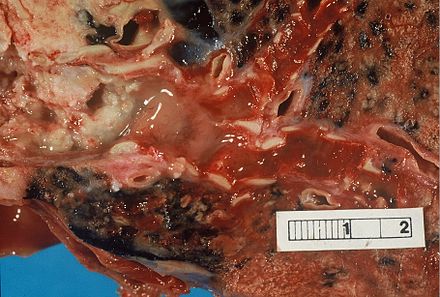
In the lung, SCC usually presents as a centrally located large-cell cancer, often linked to smoking. It can cause hypercalcaemia through ectopic production of parathyroid hormone-related protein.
Penis
Human papillomavirus (HPV), particularly HPV 16 and 18, is implicated in penile SCC. Carcinomas in situ include Bowen's disease, Erythroplasia of Queyrat, and Bowenoid papulosis.
Vagina and Cervix
Vaginal SCC typically spreads slowly but can metastasize to the lungs and liver. It is the most common type of vaginal cancer.
Other Locations
SCC can also affect the prostate, ovary, bladder, and eye, with specific characteristics and prognoses varying by location.
Diagnosis
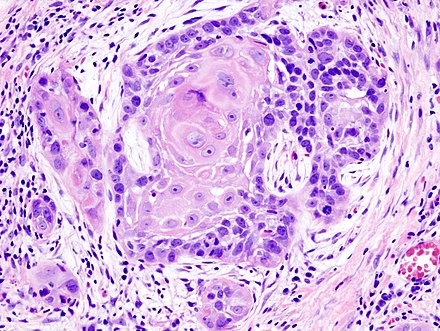
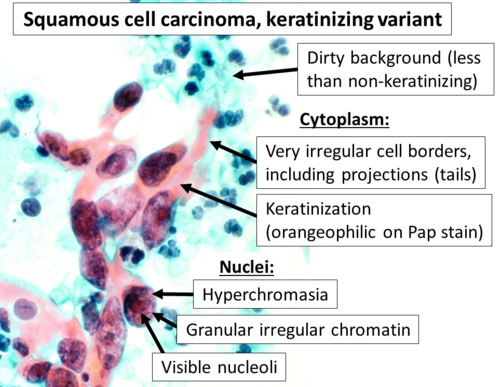

Diagnosis typically involves a biopsy for histopathology. TP63 staining is a key histological marker for SCC, essential for identifying squamous cells.

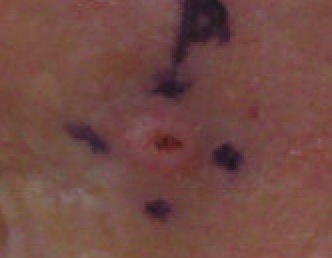
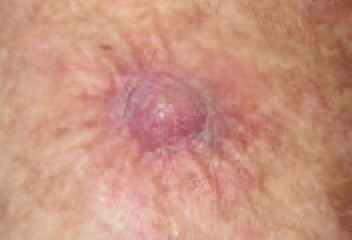
Classification
SCCs are thought to originate from repeated, uncontrolled division of cancer stem cells of epithelial lineage. They can be classified by their tissue of origin or histopathologic subtypes according to the International Classification of Diseases for Oncology (ICD-O) system. Subtypes include papillary, verrucous, large-cell keratinizing and nonkeratinizing, spindle-cell, and adenoid/pseudoglandular SCC.
Prevention
Diet has been found to influence skin cancer risk, including SCC. High-fat dairy consumption, tobacco smoking, and high alcohol intake increase SCC risk. Conversely, green leafy vegetables, raw fruits, and vegetables may offer protective benefits.
Self-assessment MCQs (single best answer)
What percentage of head and neck cancers are due to squamous-cell carcinoma (SCC)?
Which virus is particularly implicated in penile squamous-cell carcinoma (SCC)?
Which histological marker is key for identifying squamous-cell carcinoma (SCC)?
What is the second most common skin cancer in the United States?
Which of the following dietary habits may increase the risk of squamous-cell carcinoma (SCC)?
Where does esophageal squamous-cell carcinoma (ESCC) typically occur?
Which subtype of squamous-cell carcinoma (SCC) is most commonly associated with the lung and often linked to smoking?
What is a common symptom of esophageal squamous-cell carcinoma (ESCC)?
Which of the following is NOT a potential location for squamous-cell carcinoma (SCC)?
What type of biopsy result would indicate a highly differentiated squamous-cell carcinoma of the mouth?
Dentaljuce
Dentaljuce provides Enhanced Continuing Professional Development (CPD) with GDC-approved Certificates for dental professionals worldwide.
Founded in 2009 by the award-winning Masters team from the School of Dentistry at the University of Birmingham, Dentaljuce has established itself as the leading platform for online CPD.
With over 100 high-quality online courses available for a single annual membership fee, Dentaljuce offers comprehensive e-learning designed for busy dental professionals.
The courses cover a complete range of topics, from clinical skills to patient communication, and are suitable for dentists, nurses, hygienists, therapists, students, and practice managers.
Dentaljuce features Dr. Aiden, a dentally trained AI-powered personal tutor available 24/7 to assist with queries and provide guidance through complex topics, enhancing the learning experience.
Check out our range of courses, or sign up now!


